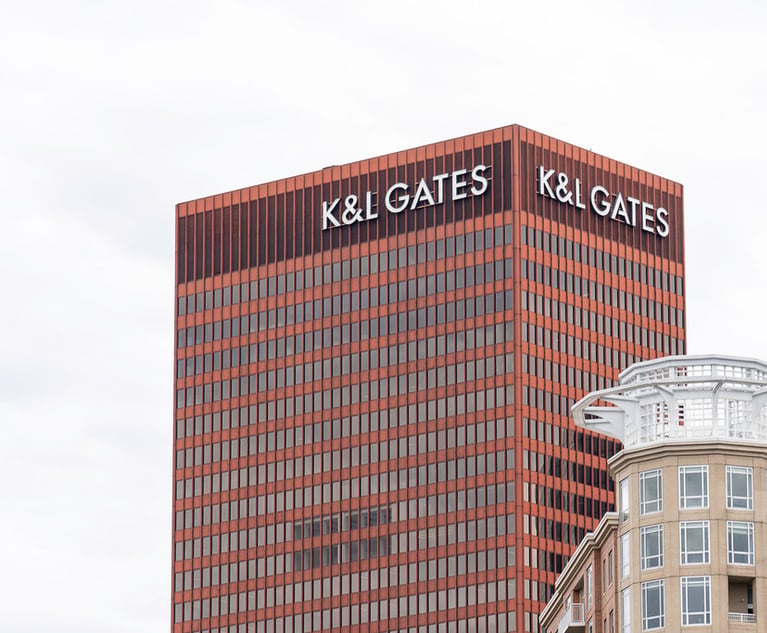 Stephen Valero, left, and Patrick Donovan, right, of Legal Clinic for the Disabled. Courtesy photos
Stephen Valero, left, and Patrick Donovan, right, of Legal Clinic for the Disabled. Courtesy photos Renters Access Act: A Welcome Development for the Phila. Rental Market
The act increases transparency in the rental application process and opens the door to tenants who, due to their past rental experiences, may otherwise be unable to rent an apartment.
February 10, 2022 at 01:50 PM
7 minute read
In response to this and the COVID-19 pandemic's devastating effect on Philadelphia tenants' records, councilmember at-large, Kendra Brooks, proposed the Renters Access Act. The act increases transparency in the rental application process and opens the door to tenants who, due to their past rental experiences, may otherwise be unable to rent an apartment. The act passed city council by a 16-1 vote, and went into effect Oct, 13, 2021. The act works to stifle the practice of blanket eviction bans and credit score thresholds typically used by landlords to quickly dispose of a prospective tenant's application.
Specifically, the act outlaws the use in whole or in part: anything showing a failure to pay during the COVID-19 emergency period; eviction actions that did not end in a judgement for the landlord; sealed eviction records; eviction judgments or filings older than four years from the date of application; eviction judgments marked satisfied or vacated; evictions filed during the COVID-19 emergency period unless they were for violent or criminal activity; or any judgment by agreement that is currently in place or where it has been satisfied or vacated. Furthermore, the act creates a "prohibition on blanket eviction and credit exclusions." See Phila Code 9-810(2). This means landlords cannot automatically decline to rent to a prospective tenant because the prospective tenant's credit score or tenant screening score derived from a tenant screening report falls below a specific numeric threshold. Importantly, the act does not prevent the use of credit scores or screening reports as part of the holistic screening process but limits specific numerical bars. The act creates a right for the tenant to ask for reconsideration within 48 hours of any denial and requires that landlords that own five or more units in Philadelphia offer the next available unit of comparable size and rent obligation if the tenant is able to show they can meet the rental obligation.
This content has been archived. It is available through our partners, LexisNexis® and Bloomberg Law.
To view this content, please continue to their sites.
Not a Lexis Subscriber?
Subscribe Now
Not a Bloomberg Law Subscriber?
Subscribe Now
NOT FOR REPRINT
© 2025 ALM Global, LLC, All Rights Reserved. Request academic re-use from www.copyright.com. All other uses, submit a request to [email protected]. For more information visit Asset & Logo Licensing.
You Might Like
View All
K&L Gates Sheds Space, but Will Stay in Flagship Pittsburgh Office After Lease Renewal

Commonwealth Court Overturns Award of Damages Assessed Against Landlord on Claims of Unlawful Discrimination
6 minute read

Wholesale Real Estate Transaction Transparency and Protection Act Takes Effect Jan. 4: What You Need to Know
Trending Stories
- 1Courts Grapple With The Corporate Transparency Act
- 2FTC Chair Lina Khan Sues John Deere Over 'Right to Repair,' Infuriates Successor
- 3‘Facebook’s Descent Into Toxic Masculinity’ Prompts Stanford Professor to Drop Meta as Client
- 4Pa. Superior Court: Sorority's Interview Notes Not Shielded From Discovery in Lawsuit Over Student's Death
- 5Kraken’s Chief Legal Officer Exits, Eyes Role in Trump Administration
Who Got The Work
J. Brugh Lower of Gibbons has entered an appearance for industrial equipment supplier Devco Corporation in a pending trademark infringement lawsuit. The suit, accusing the defendant of selling knock-off Graco products, was filed Dec. 18 in New Jersey District Court by Rivkin Radler on behalf of Graco Inc. and Graco Minnesota. The case, assigned to U.S. District Judge Zahid N. Quraishi, is 3:24-cv-11294, Graco Inc. et al v. Devco Corporation.
Who Got The Work
Rebecca Maller-Stein and Kent A. Yalowitz of Arnold & Porter Kaye Scholer have entered their appearances for Hanaco Venture Capital and its executives, Lior Prosor and David Frankel, in a pending securities lawsuit. The action, filed on Dec. 24 in New York Southern District Court by Zell, Aron & Co. on behalf of Goldeneye Advisors, accuses the defendants of negligently and fraudulently managing the plaintiff's $1 million investment. The case, assigned to U.S. District Judge Vernon S. Broderick, is 1:24-cv-09918, Goldeneye Advisors, LLC v. Hanaco Venture Capital, Ltd. et al.
Who Got The Work
Attorneys from A&O Shearman has stepped in as defense counsel for Toronto-Dominion Bank and other defendants in a pending securities class action. The suit, filed Dec. 11 in New York Southern District Court by Bleichmar Fonti & Auld, accuses the defendants of concealing the bank's 'pervasive' deficiencies in regards to its compliance with the Bank Secrecy Act and the quality of its anti-money laundering controls. The case, assigned to U.S. District Judge Arun Subramanian, is 1:24-cv-09445, Gonzalez v. The Toronto-Dominion Bank et al.
Who Got The Work
Crown Castle International, a Pennsylvania company providing shared communications infrastructure, has turned to Luke D. Wolf of Gordon Rees Scully Mansukhani to fend off a pending breach-of-contract lawsuit. The court action, filed Nov. 25 in Michigan Eastern District Court by Hooper Hathaway PC on behalf of The Town Residences LLC, accuses Crown Castle of failing to transfer approximately $30,000 in utility payments from T-Mobile in breach of a roof-top lease and assignment agreement. The case, assigned to U.S. District Judge Susan K. Declercq, is 2:24-cv-13131, The Town Residences LLC v. T-Mobile US, Inc. et al.
Who Got The Work
Wilfred P. Coronato and Daniel M. Schwartz of McCarter & English have stepped in as defense counsel to Electrolux Home Products Inc. in a pending product liability lawsuit. The court action, filed Nov. 26 in New York Eastern District Court by Poulos Lopiccolo PC and Nagel Rice LLP on behalf of David Stern, alleges that the defendant's refrigerators’ drawers and shelving repeatedly break and fall apart within months after purchase. The case, assigned to U.S. District Judge Joan M. Azrack, is 2:24-cv-08204, Stern v. Electrolux Home Products, Inc.
Featured Firms
Law Offices of Gary Martin Hays & Associates, P.C.
(470) 294-1674
Law Offices of Mark E. Salomone
(857) 444-6468
Smith & Hassler
(713) 739-1250





